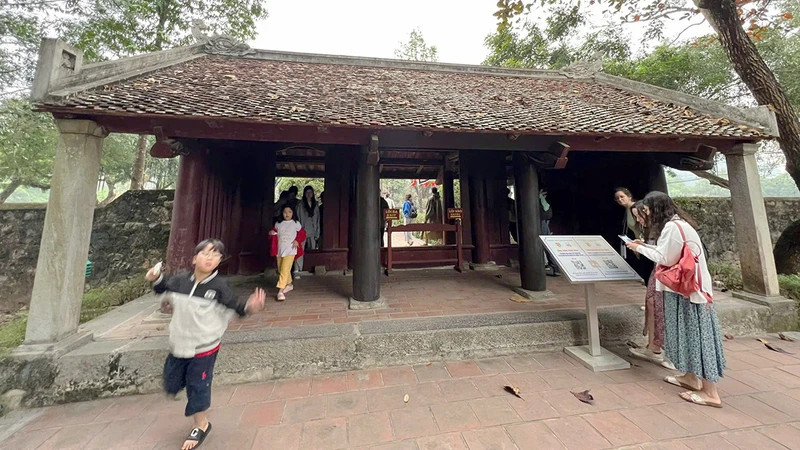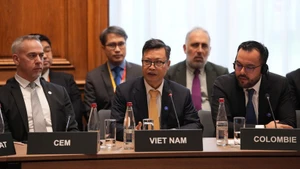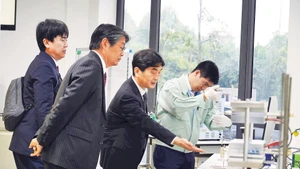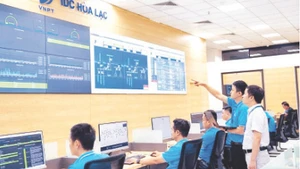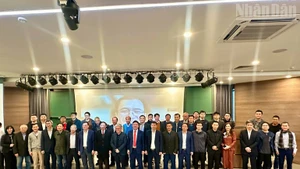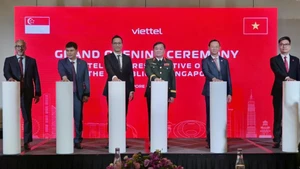Many provinces and cities are having creative and practical ways to welcome opportunities, overcome barriers to enter the digital age. They are determined to implement the national digital transformation programme.
In recent times, Ninh Binh has been making efforts to carry out digital transformation in all fields to implement the provincial planning for the period 2021-2030 with a vision to 2050 according to the prime minister’s Decision No. 218/QD-TTg (dated March 4, 2024).
Digital transformation and green transformation are the core pillars for implementing the strategic planning orientation for Ninh Binh Province to become a centrally-governed city by 2035, with the characteristics of a "Millennium heritage city, creative city". Ninh Binh is determined to make a breakthrough and become a fairly developed province in the Red River Delta, a leading tourist centre of the country and Southeast Asia, while making efforts to attract investors to do business in industrial park infrastructure, auto support industry projects, electronic components, high-tech agricultural processing; along with service and trade projects associated with tourism and serving tourism development, creating attraction and retaining tourists.
Doan Minh Huan,
Secretary of Ninh Binh Provincial Party Committee
Regarding the implementation of Resolution No. 01-NQ/TU of the Provincial Party Committee (dated April 20, 2021) on “Building e-government and digital transformation to 2025, with orientation to 2030”, as of October 2024, Ninh Binh had basically completed the deployment and put into operation and stably and effectively used 15 digital platforms and shared information systems to serve the construction and development of digital government and digital transformation.
The province's open data portal at https://data.ninhbinh.gov.vn, put into operation since October 2023, has publicly disclosed open data for 11 fields; there have been 49,826 visits with more than 1,500 data shared. The electronic data warehouse of organisations and individuals on the provincial administrative procedure settlement system, put into operation and use since June 2023, has issued 95,247 accounts for people and businesses.
The databases of residents, land, and civil servants have been activated and authenticated at a rate of more than 90%. Departments, branches, and localities in the area are resolutely directing the implementation of many synchronous solutions to promote digital transformation to improve the business environment and enhance provincial competitiveness.
Le Thi Bich Thuc, Deputy Director of the Centre for Conservation of Historical and Cultural Relics of Hoa Lu Ancient Capital, said the centre has applied advanced techniques and technologies in displaying and introducing the special national relic of Hoa Lu Ancient Capital.
All information in the form of text, audio, and images is uploaded to the digital ecosystem in an intuitive and vivid manner, easily connecting with social networking sites, proactively approaching the needs of society. Thanks to that, the image of Ninh Binh heritage is more widely promoted to people in the country and the world.
Ninh Binh continues to affirm itself as a leading destination for tourists, reaching more than 7.68 million visitors in the first 10 months of 2024, while revenue from tourism activities reached 7,773 billion VND, an increase of 40.3% over the same period last year.
However, Ninh Binh still has many difficulties and challenges in the short, medium and long term. According to Doan Thanh Hai, Director of the Department of Information and Communications, the locality still has many difficulties in organising the apparatus and personnel to do digital transformation work from the province to the commune level.
The exploitation and use of digital platforms, the creation, development and management of digital data in some agencies, units and localities have not received due attention, and the quality and efficiency have not yet met the requirements of building a digital government and digital transformation.
Telecommunications infrastructure is not synchronised with traffic infrastructure and urban infrastructure. These challenges require Ninh Binh to have a clear strategy and effective implementation plan, while strengthening coordination between all levels of government, businesses and the community to achieve sustainable development goals.
According to Provincial Party Secretary Doan Minh Huan, in order to successfully implement the digital transformation process, Ninh Binh needs to focus on implementing solutions to promote effective and quality digital transformation.
The province needs to continue training and improving knowledge and qualifications on digital data; digital skills; and skills in handling, responding to, and overcoming information security incidents associated with job positions for civil servants and officials.
In addition to building a legal corridor to support the development of the digital economy and the information technology sector, Ninh Binh needs to make efforts to promote digital transformation so that businesses can effectively apply new technologies, improve competitiveness in the market and have many products with QR codes introduced to the market.
On the other hand, building a model of applying digital transformation in socio-economic development, forming the appearance of digital villages and smart communes to replicate throughout the province. The Digital Village model in Yen Hoa Commune (Yen Mo District) has been introduced by the Food and Agriculture Organisation of the United Nations as a Digital Village model for countries around the world to refer to.
Associate Professor, Dr Hoang Huu Hanh, Director General of the International Cooperation Department under the Ministry of Information and Communications and Chairman of the Scientific Council of the Institute for Creativity and Digital Transformation (VIDTI) under the Vietnam Union of Science and Technology Associations, recommended that Ninh Binh should focus on developing high-tech agriculture, building rural areas associated with green/clean energy and sustainable development.
According to Kieu Cong Thuoc, Chairman of the Vietnam Innovation Startup Fund (VNFund), Ninh Binh is facing a great opportunity for development through the application of comprehensive and optimal solutions in the short, medium and long term. Therefore, the province needs to focus on training and developing human resources, improving information technology infrastructure, simplifying administrative procedures, and investing in synchronous transport infrastructure.
At the same time, the province needs to reform the investment environment, build a network of cooperation and partnerships, improve the quality of education and training, establish preferential policies and special support for experts and innovative businesses, and develop sustainable development strategies.
The implementation process must continuously evaluate the effectiveness of policies and programmes to adjust and improve, and at the same time create a mechanism to receive and handle feedback from the community and businesses to improve the quality of management and services.
